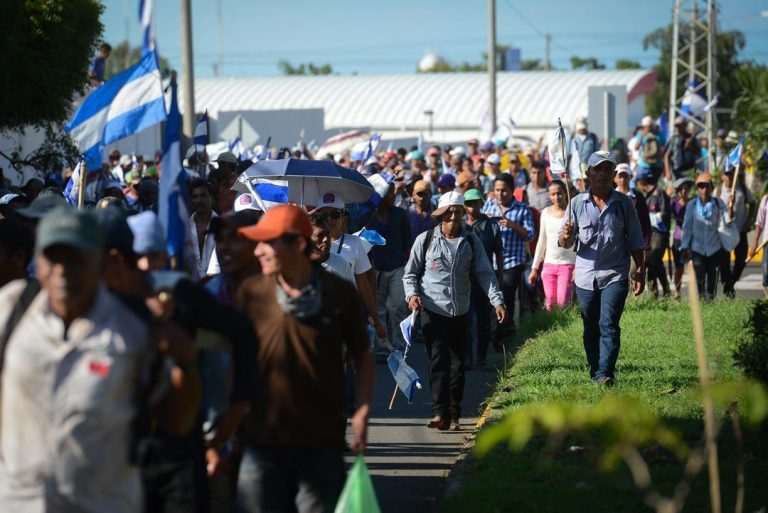17 de agosto 2019

Children of Exile: The Births “Sowing Hope” in the Camp of Nicaraguan Farmers

PUBLICIDAD 1M
PUBLICIDAD 4D
PUBLICIDAD 5D
Nevertheless, Mairena insisted: “Such a project has never existed; what has existed is the intention of stealing our lands.”

Hundreds of farmers in a national march against the canal project in Managua. Photo: Carlos Herrera / Confidencial
In a press conference on Wednesday, August 14, a leader of the Farmers’ Movement of Nicaragua noted that President Daniel Ortega’s renewed interest in constructing an inter-oceanic canal also brings a renewed threat of expropriation for the rural residents in the south of the country.
“To us, it’s a threat, because of the way they’ve been taking properties away from the farmers – and not just recently. During the 80s they also confiscated a lot of lands, and from that point it became a civil war that left 50,000 dead,” stated farm leader Medardo Mairena in the press conference.
Ortega announced on August 13th that he hasn’t given up on the construction of an inter-oceanic canal in Nicaragua, despite the apparent failure of the fifty-billion-dollar project initiated in 2013 with the Chinese magnate Wang Jing. At that time, the project was slated to be open for operation in 2018.
Nevertheless, Mairena insisted: “Such a project has never existed; what has existed is the intention of stealing our lands.”
Francisca Ramirez, former president of this rural movement, speaking from exile stated that “any such initiative is false… It’s an act of desperation on the part of the Ortega regime to distract attention from all the crimes against humanity that he’s committed in Nicaragua and to maintain his grassroots support based on a lie.”
The Ortega government which also presided over Nicaragua from 1980 to 1990, has been accused by the Inter-American Commission for Human Rights (IACHR) of being responsible for “crimes against humanity” during the socio-political crisis that began in 2018, 11 years after the regime’s return to power.
The farmers insisted that Ortega has neither the resources nor the legal basis for his aspirations of constructing an inter-oceanic canal, since the law obligates Nicaragua to dissolve the project if six years pass without any guarantee of financing. The six years in question finalized this past June 13.
“There’s no project here. Their interest is in stealing land and justifying the corruption. They’re goading us, be it to kill us, or to kidnap us anew. He’s capable of anything to continue harming the Nicaraguans,” stated Mairena, who is an ex-political prisoner”.
The rural residents in the south of Nicaragua are viewed as one of the sectors Ortega has most repressed, especially since in 2013 when they initiated a series of over 60 marches against the canal project.
Statistics from the opposition National Blue and White Unity movement indicate that in July alone nearly 20 people from the opposition have been killed in Nicaragua, the majority of them rural residents.
The Farmers’ Movement called on the international community to take action from outside the country, since the Ortega government is maintaining a policy of “selective executions” of his critics.
“We ask the international community: Until when? Until what? How many more lives do we Nicaraguans have to give so that there be justice here? How many more killings, kidnappings, torture?” demanded Mairena.
According to the IACHR at least 328 people have died in the course of Nicaragua’s socio-political crisis, although a local organization has tabulated 595 and the government only admits to 200.
In addition, the crisis has left thousands wounded, hundreds jailed or missing and more than 62,000 Nicaraguans in exile.
Archivado como:
PUBLICIDAD 3M
Confidencial es un diario digital nicaragüense, de formato multimedia, fundado por Carlos F. Chamorro en junio de 1996. Inició como un semanario impreso y hoy es un medio de referencia regional con información, análisis, entrevistas, perfiles, reportajes e investigaciones sobre Nicaragua, informando desde el exilio por la persecución política de la dictadura de Daniel Ortega y Rosario Murillo.
PUBLICIDAD 3D